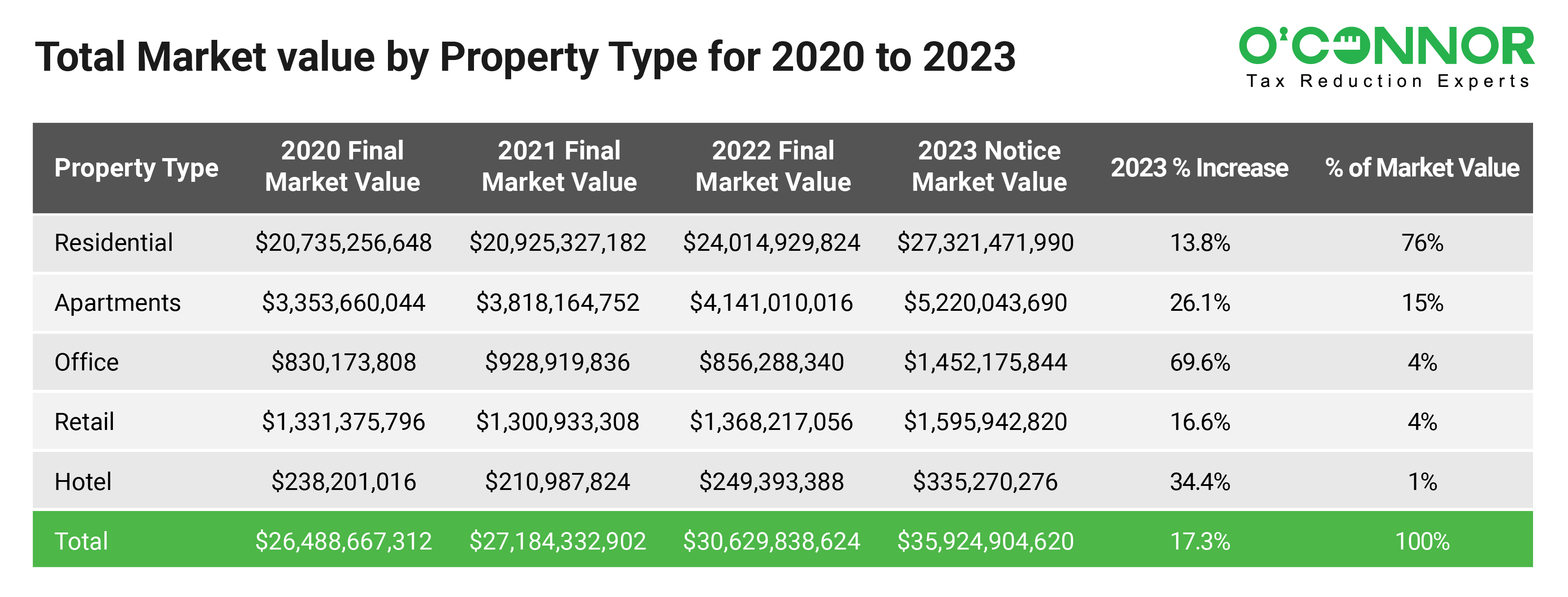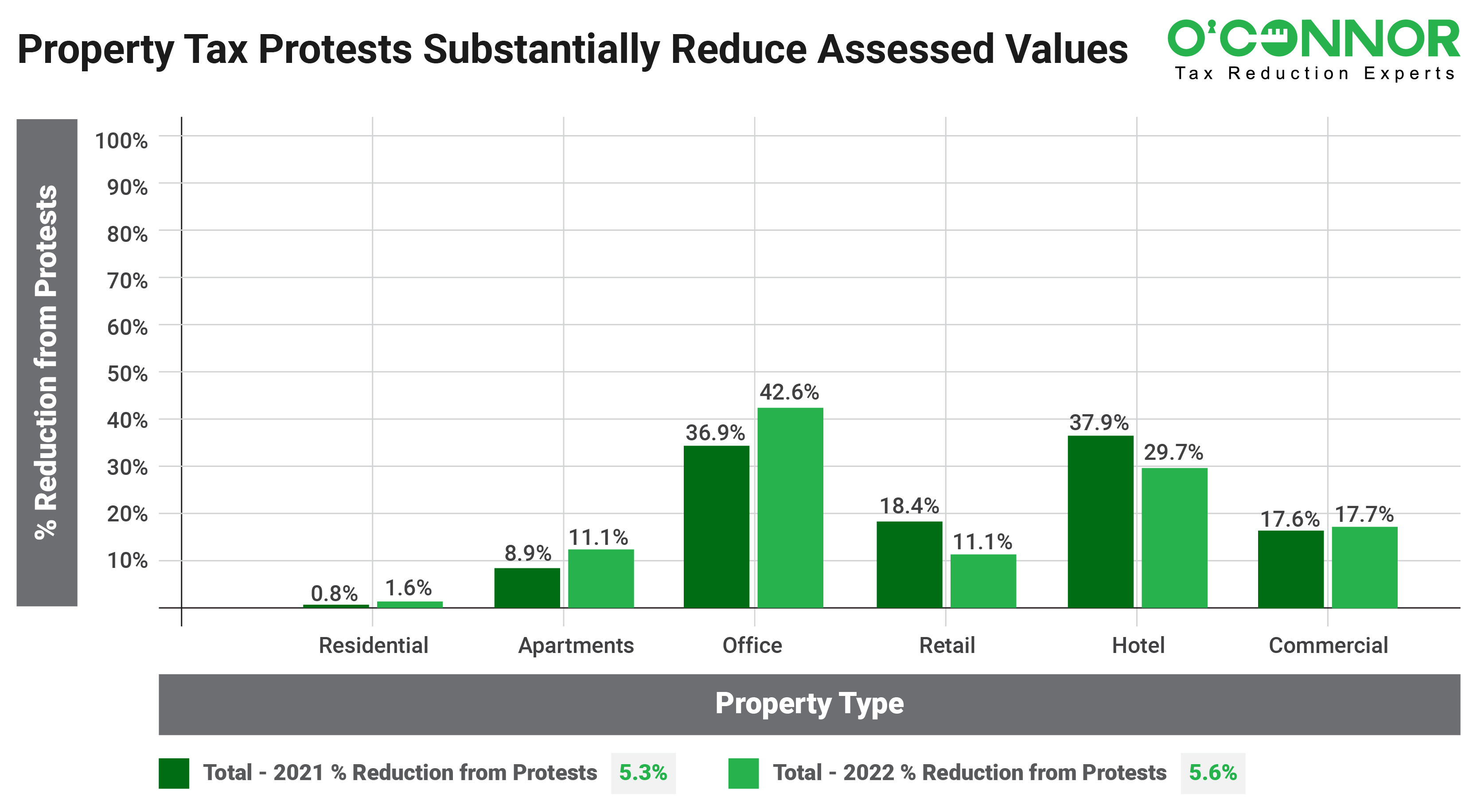Cook County’s 2023 reassessment places over 60% of the increases in market value on homeowners with 38% on commercial property. The total assessment for 15 townships reviewed increased from $30.6 billion to $35.9 billion, a 17.3% increase. Home values were increased $3.3 billion (13.8%) while commercial property values were increased by $2.0 billion (30.6%). The townships included Barrington, Berwyn, Calumet, Hanover, Oak Park, River Forest, Riverside, Rogers Park, Lemont, New Trier, Orland and Schaumburg.
Following is a summary of total market value by property type for 2020 to 2023:

Homes account for 76% of the total market value of taxable property in the 15 noted townships in Cook County, with apartments, office, retail, and hotel accounting for 24%. (Note: these values do not include land.)
Property Taxes for Homes Exceed Taxes for Apartments, Office, Retail and Hotel
Home property taxes account for 55% of the total property taxes for the townships of Barrington, Berwyn, Calumet, Hanover, Oak Park, River Forest, Riverside, Rogers Park, Lemont, New Trier, Orland, and Schaumburg. The assessment ratio is 10% for homes versus 25% for commercial in Cook County. The assessment ratio helps to spread the property tax base more equally between homes (55%) and commercial (45%), for the noted townships, not considering vacant land and business personal property.
Property Tax Protests Substantially Reduce Assessed Values
Homeowners and commercial property owners substantially reduce their Cook County property tax assessments through property tax protests. Owners can protest at multiple levels, starting with a protest to the Cook County Assessor.
Both homeowners and commercial owners can appeal the Cook County Assessor’s value. Relatively few homeowners protest while most of the commercial value is protested. While homeowners account for 76% of the market value of taxable property, they account for only 22% of the market value reductions through appeals while owners of apartments, office, retail, and hotel account for 78% of market value reductions for the noted townships (Barrington, Berwyn, Calumet, Hanover, Oak Park, River Forest, Riverside, Rogers Park, Lemont, New Trier, Orland, and Schaumburg) in 2022.
In 2022, homeowners reduced their initial estimate of market value by $402 million, or 1.6%. Owners of apartments, office, retail, and hotel reduced their values by $1.43 billion, or 17.6%.

Homeowners Are Over-Paying by Accepting the Initial Assessed Value
Commercial property owners have deep knowledge of the property tax assessment and protest process and effectively utilize their right to appeal initial assessments. Note the 42.6% reduction for office buildings and the 29.7% reduction for hotels in 2022 versus just 1.6% reduction for homeowners for the noted townships in Cook County.
Commercial property owners are simply but effectively utilizing their statutory right to challenge initial value estimates generated by the Cook County Assessor. Homeowners are much less likely to protest and pay the full initial estimate of value from the Cook County Assessor.
What many homeowners do not understand is: 1) many of the initial assessments exceed market value and 2) owners can protest both market value and unequal appraisal and 3) most tax appeals are successful, particularly in years when the assessor reassesses an area.
The Cook County assessor uses a mass appraisal process to generate the initial values which are inherently unreliable. Mass appraisal uses inaccurate property data, and inaccurate property valuation factors, and an incomplete model to generate the initial values. The mass appraisal process does not value homes individually; therefore market trends impact the assessor’s values heavily. The model is incomplete because assessors typically only consider physical depreciation. The shortcomings in the assessors estimate of value provide opportunities for property owners to reduce their property taxes.
Challenging taxes is an American tradition going back to the Boston Tea Party in 1773. If you are not appealing your Cook County property tax assessment, you are very likely paying more property taxes than necessary.

